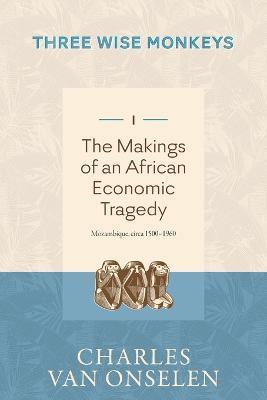THE MAKINGS OF AN AFRICAN ECONOMIC TRAGEDY - Volume 1/Three Wise Monkeys

THE MAKINGS OF AN AFRICAN ECONOMIC TRAGEDY - Volume 1/Three Wise Monkeys
Three Wise Monkeys presents a startling new way of viewing the entangled, often hidden, economic, political and social dynamics that informed the rise of 20th-century South Africa, often at the expense of neighbouring Mozambique. It is history that transcends state boundaries to take the reader into previously uncharted domains of the recent past. This 3-volume work was published as a box set but is also available as individual volumes.
Volume 1, 'The Making of an African Economic Tragedy', looks at the Portuguese colonisation of Mozambique, and the gradual transformation of the colony into a reservoir of cheap labour, first during the Atlantic slave trade and then during the rise of the voracious Rand mining industry.
In a relatively short period during the late 19th century, Mozambique went from being a sleepy imperial backwater, its economy focused on the Indian Ocean, to a weak client feeding into the South African economy, which was being transformed by the discoveries of first diamonds and then gold. The desperately poor Sul do Save region in southern Mozambique became the hunting ground for agents recruiting labour for the Witwatersrand mines, and a grim trade in black bodies defined this unequal relationship.
A profound imbalance was created between the two territories, with Mozambique locked into financial dependence on its neighbour to the west. In effect, the South African mining industry got to own a large part of the harbour infrastructure in the capital, Lourenço Marques.
The story of Mozambique's finances, and particularly of its 'central bank', the Banco Nacional UItramarino, illustrates how the colony's commercial economy and sluggish administration were no match for the power of the Rand mining houses and British sterling. Mozambique was colonised twice over - first by Portugal and then by South Africa.
PRP: 135.63 Lei
Acesta este Prețul Recomandat de Producător. Prețul de vânzare al produsului este afișat mai jos.
108.50Lei
108.50Lei
135.63 LeiLivrare in 2-4 saptamani
Descrierea produsului
Three Wise Monkeys presents a startling new way of viewing the entangled, often hidden, economic, political and social dynamics that informed the rise of 20th-century South Africa, often at the expense of neighbouring Mozambique. It is history that transcends state boundaries to take the reader into previously uncharted domains of the recent past. This 3-volume work was published as a box set but is also available as individual volumes.
Volume 1, 'The Making of an African Economic Tragedy', looks at the Portuguese colonisation of Mozambique, and the gradual transformation of the colony into a reservoir of cheap labour, first during the Atlantic slave trade and then during the rise of the voracious Rand mining industry.
In a relatively short period during the late 19th century, Mozambique went from being a sleepy imperial backwater, its economy focused on the Indian Ocean, to a weak client feeding into the South African economy, which was being transformed by the discoveries of first diamonds and then gold. The desperately poor Sul do Save region in southern Mozambique became the hunting ground for agents recruiting labour for the Witwatersrand mines, and a grim trade in black bodies defined this unequal relationship.
A profound imbalance was created between the two territories, with Mozambique locked into financial dependence on its neighbour to the west. In effect, the South African mining industry got to own a large part of the harbour infrastructure in the capital, Lourenço Marques.
The story of Mozambique's finances, and particularly of its 'central bank', the Banco Nacional UItramarino, illustrates how the colony's commercial economy and sluggish administration were no match for the power of the Rand mining houses and British sterling. Mozambique was colonised twice over - first by Portugal and then by South Africa.
Detaliile produsului










